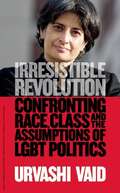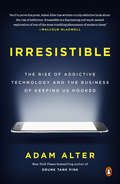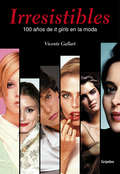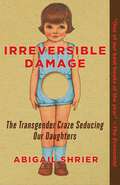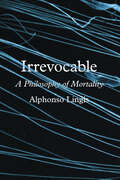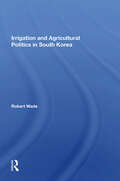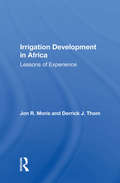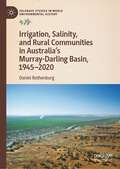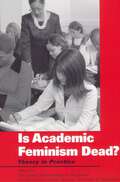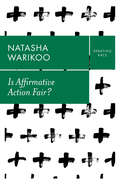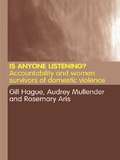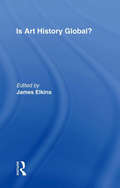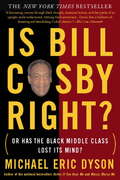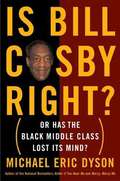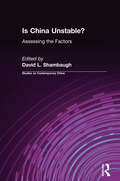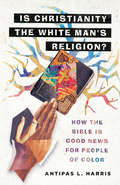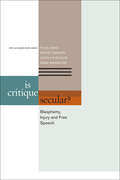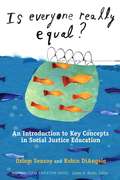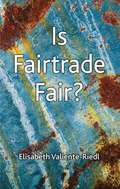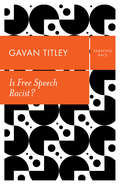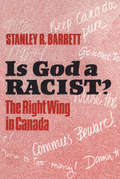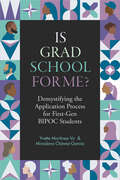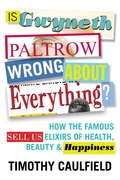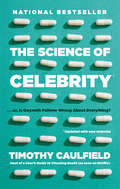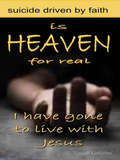- Table View
- List View
Irresistible Revolution: Confronting Race, Class and the Assumptions of Lesbian, Gay, Bisexual, and Transgender Politics
by Urvashi VaidFrom one of the nation's best-known social justice leaders and community activists comes a strategic and informed argument about the pitfalls of limited political vision, and the benefits of an agenda that encompasses, yet moves beyond, equality. The LGBT movement is on one of the most active, contested, and engaging social movements in the world. This optimistic book challenges advocates for LGBT rights in the U. S. to aspire beyond the narrow framework of equality. It outlines a more substantive politics with race, class, and gender at its foundation, and suggests that such a politics will produce greater and more meaningful change for a larger number of people. Irresistible Revolution is intended for a broad and general audience. The book turns an experienced and thoughtful lens onto many common controversies, rhetoric, and strategic questions that face contemporary social change movements: pursuit of broad or narrow agendas, integration of economic and racial justice, integrating sexual orientation and gender identity in human rights frameworks, the persistence of sexism, the dilemmas of bipartisanship, and the challenge of seeing beyond the short term to secure gains made for the long run.
Irresistible: The Rise Of Addictive Technology And The Business Of Keeping Us Hooked
by Adam AlterWelcome to the age of behavioral addiction—an age in which half of the American population is addicted to at least one behavior. We obsess over our emails, Instagram likes, and Facebook feeds; we binge on TV episodes and YouTube videos; we work longer hours each year; and we spend an average of three hours each day using our smartphones. Half of us would rather suffer a broken bone than a broken phone, and Millennial kids spend so much time in front of screens that they struggle to interact with real, live humans. In this revolutionary book, Adam Alter, a professor of psychology and marketing at NYU, tracks the rise of behavioral addiction, and explains why so many of today's products are irresistible. Though these miraculous products melt the miles that separate people across the globe, their extraordinary and sometimes damaging magnetism is no accident. The companies that design these products tweak them over time until they become almost impossible to resist. By reverse engineering behavioral addiction, Alter explains how we can harness addictive products for the good—to improve how we communicate with each other, spend and save our money, and set boundaries between work and play—and how we can mitigate their most damaging effects on our well-being, and the health and happiness of our children.Adam Alter's previous book, Drunk Tank Pink: And Other Unexpected Forces that Shape How We Think, Feel, and Behave is available in paperback from Penguin.
Irresistibles. 100 años de it girls en la moda
by Vicente Gallart¿QUIÉN ES ESA CHICA?Desde mediados del siglo XX el concepto it girl ha ejercido una enorme influencia en la moda. Ahora que este término aparece continuamente en revistas, páginas web y blogs, no está de más recordar que en la sociedad occidental siempre han existido esas chicas y mujeres extraordinarias que destacaron por su estilo, su forma de vida o su gusto impecable a la hora de vestir. Famosas, bellas, ricas, rebeldes, sexys o intelectuales..., a lo largo de 100 años las it girls han marcado tendencia a través de las páginas de papel couché, y muchas se han convertido en iconos de estilo más allá de las modas del momento. En este libro se les rinde el homenaje que se merecen.Repasar sus vidas, trágicas o dichosas, es también la excusa perfecta para sumergirse en los ambientes más fascinantes del pasado siglo. De los bailes de la altasociedad europea a la transgresora Factory de Andy Warhol, de la mítica pista de baile de Studio 54 a los cafés parisinos de la vanguardia artística..., en todos esos escenarios glamurosos brillaron las mujeres que tenían ese "algo" que las hacía únicas y que les ha permitido perdurar hasta el día de hoy.
Irreversible Damage: The Transgender Craze Seducing Our Daughters
by Abigail ShrierNAMED A BOOK OF THE YEAR BY THE ECONOMIST AND ONE OF THE BEST BOOKS OF 2021 BY THE TIMES AND THE SUNDAY TIMES"Irreversible Damage . . . has caused a storm. Abigail Shrier, a Wall Street Journal writer, does something simple yet devastating: she rigorously lays out the facts." —Janice Turner, The Times of LondonUntil just a few years ago, gender dysphoria—severe discomfort in one&’s biological sex—was vanishingly rare. It was typically found in less than .01 percent of the population, emerged in early childhood, and afflicted males almost exclusively.But today whole groups of female friends in colleges, high schools, and even middle schools across the country are coming out as &“transgender.&” These are girls who had never experienced any discomfort in their biological sex until they heard a coming-out story from a speaker at a school assembly or discovered the internet community of trans &“influencers.&”Unsuspecting parents are awakening to find their daughters in thrall to hip trans YouTube stars and &“gender-affirming&” educators and therapists who push life-changing interventions on young girls—including medically unnecessary double mastectomies and puberty blockers that can cause permanent infertility.Abigail Shrier, a writer for the Wall Street Journal, has dug deep into the trans epidemic, talking to the girls, their agonized parents, and the counselors and doctors who enable gender transitions, as well as to &“detransitioners&”—young women who bitterly regret what they have done to themselves.Coming out as transgender immediately boosts these girls&’ social status, Shrier finds, but once they take the first steps of transition, it is not easy to walk back. She offers urgently needed advice about how parents can protect their daughters.A generation of girls is at risk. Abigail Shrier&’s essential book will help you understand what the trans craze is and how you can inoculate your child against it—or how to retrieve her from this dangerous path.
Irrevocable: A Philosophy of Mortality
by Alphonso LingisIn his latest book, the prolific writer and thinker Alphonso Lingis brings interdisciplinarity and lyrical philosophizing to the weight of reality, the weight of things, and the weight of life itself. Drawing from philosophy, anthropology, psychology, religion, and science, Lingis seeks to uncover what in our reality escapes our attempts at measuring and categorizing. Writing as much from his own experiences and those of others as from his longstanding engagement with phenomenology and existentialism, Irrevocable studies the world in which shadows, reflections, halos, and reverberations count as much as the carpentry of things. Whether describing religious art and ritual, suffering, war and disease, the pleasures of love, the wonders of nature, archaeological findings, surfing, volcanoes, or jellyfish, Lingis writes with equal measures of rigor and abandon about the vicissitudes of our practices and beliefs. Knowing that birth, the essential encounters in our lives, crippling diseases and accidents, and even death are all determined by chance, how do we recognize and understand such chance? After facing tragedies, what makes it possible to live on while recognizing our irrevocable losses? Lingis’s investigations are accompanied by his own vivid photographs from around the world. Balancing the local and the global, and ranging across vast expanses of culture and time, Irrevocable sounds the depths of both our passions and our impassioned bodies and minds.
Irrigation And Agricultural Politics In South Korea
by Robert WadeThis book examines how state and local institutions that manage water conveyance and drainage actually function. Thus a great deal is revealed about the relationships and power struggles that exist between government and the people and between central and local authorities.
Irrigation Development In Africa: Lessons Of Experience
by Jon R. MorisIrrigation Development in Africa: Lessons of Experience is a veritable encyclopedia of information on African irrigation. It describes a significant subset of the African irrigation experience, from traditional flood recession systems to large projects like Gezira and Bura.
Irrigation, Salinity, and Rural Communities in Australia's Murray-Darling Basin, 1945–2020 (Palgrave Studies in World Environmental History)
by Daniel RothenburgThis book explores the issue of salinization in the context of contemporary conflicts about irrigation, water, and the environment in Australia, considering the Murray-Darling Basin in particular. It provides an environmental and social history charting the transformation of rural communities in the basin through the salinization of soils and water. Focusing on the Goulburn-Murray Irrigation district in the southwest of the Murray-Darling basin – the largest irrigation district in Australia – it explores the history of state-directed, large-scale engineering in the district, where the environment has been altered dramatically to facilitate white agricultural settlement inland. Changes to the landscape led to extensive salinization, however – a significant environmental threat in Australia. This book traces the impact of these changes on rural communities, taking a ‘bottom-up’ approach, highlighting the connections between environmental, social, and political change. It provides an important reflection on the importance of environmental history for facing the challenges posed by anthropogenic climate change.
Is Academic Feminism Dead?: Theory in Practice
by Akhil GuptaWhat role does theory play in academia today? How can feminist theory be made more relevant to the very real struggles undertaken by women of all professions, races, and sexual orientation? How can it be directed into more effective social activism, and how is theory itself a form of practice? Feminist theory and political activism need not—indeed cannot—be distinct and alienated from one another. To reconcile the gulf between word and deed, scholar-activists from a broad range of disciplines have come together here to explore the ways in which practice and theory intersect and interact. The authors argue against overly abstract and esoteric theorizing that fails its own tests of responsible political practice and suggest alternative methods by which to understand feminist issues and attain feminist goals. They also examine the current state of affairs in the academy, exposing the ways in which universities systematically reinforce social hierarchies and offering important and intelligent suggestions for curricular and structural changes. Is Academic Feminism Dead? marks a significant step forward in relating academic and social movement feminism. It recognizes and examines the diverse realities experienced by women, as well as the changing political, cultural, and economic realities shaping contemporary feminism.
Is Affirmative Action Fair?: The Myth of Equity in College Admissions (Debating Race)
by Natasha K. WarikooAffirmative action in college admissions – considering whether an applicant is part of an underrepresented group when making selection decisions – has long been a topic of heated public debate. Some argue that it undermines racial equity. Others advocate for its ability to promote equal opportunity in a racially unequal society. Who is right? In this thought-provoking book, Natasha Warikoo dives into the arguments for and against a policy that has made it to the US Supreme Court many times. She digs into the purposes of higher education and the selection process itself to argue that it is a mistake to equate college admissions with personal merit and reward for individual accomplishment. Rather, college admissions should be based on furthering the mission of higher education: contributing to our shared democracy and to the human condition. Ultimately, Warikoo concludes that a focus on individual fairness conceals much more important questions about justice. No matter what their perspective, readers of this book will find themselves thinking anew and asking the deeper questions that underlie this emotive debate.
Is Anyone Listening?: Accountability and Women Survivors of Domestic Violence
by Gill Hague Audrey Mullender Rosemary ArisDomestic violence is in the public eye as never before, but how often are abused women consulted or involved in the new services and policies? This book investigates, and reveals that the voices of survivors of domestic violence are often simply not heard; silenced, the women themselves become invisible. Is Anyone Listening? draws on the experiences of other service user movements to provide a strong conceptual framework for thinking about abused women's participation in policy and service development. It discusses empowerment issues and the women's movement against gender violence, exploring how far refuge organisations and other women's movement services have influenced statutory services and vice versa. It includes many practical ideas for involving women in the improvement of both policy and practice and gives examples of inspiring and innovatory projects.Based on a study carried out as part of the Economic and Social Research Council's Violence Research Programme, Is Anyone Listening? offers a unique analysis of the sensitive and complex issues involved in developing service user participation within the domestic violence field. The insights it provides will enable policy-makers, activists, students, practitioners and women who have experienced domestic violence to move forward together.
Is Art History Global? (The Art Seminar #Vol. 3)
by James ElkinsThis is the third volume in The Art Seminar, James Elkin's series of conversations on art and visual studies.Is Art History Global? stages an international conversation among art historians and critics on the subject of the practice and responsibility of global thinking within the discipline. Participants range from Keith Moxey of Columbia University to Cao Yiqiang, Ding Ning, Cuautemoc Medina, Oliver Debroise, Renato Gonzalez Mello, and other scholars.
Is Bill Cosby Right?: Or Has the Black Middle Class Lost Its Mind?
by Michael Eric DysonMichael Eric Dyson took America by storm with this provocative expose of the class and generational divide that is tearing black America apart. Nothing exposed the class and generational divide in black America more starkly than Bill Cosby’s now-infamous assault on the black poor when he received an NAACP award in the spring of 2004. The comedian-cum-social critic lamented the lack of parenting, poor academic performance, sexual promiscuity, and criminal behavior among what he called the "knuckleheads” of the African-American community. Even more surprising than his comments, however, was the fact that his audience laughed and applauded. Best-selling writer, preacher, and scholar Michael Eric Dyson uses the Cosby brouhaha as a window on a growing cultural divide within the African-American community. According to Dyson, the "Afristocracy”--lawyers, physicians, intellectuals, bankers, civil rights leaders, entertainers, and other professionals--looks with disdain upon the black poor who make up the "Ghettocracy”--single mothers on welfare, the married, single, and working poor, the incarcerated, and a battalion of impoverished children. Dyson explains why the black middle class has joined mainstream America to blame the poor for their troubles, rather than tackling the systemic injustices that shape their lives. He exposes the flawed logic of Cosby’s diatribe and offers a principled defense of the wrongly maligned black citizens at the bottom of the social totem pole. Displaying the critical prowess that has made him the nation’s preeminent spokesman for the hip-hop generation, Dyson challenges us all--black and white--to confront the social problems that the civil rights movement failed to solve.
Is Bill Cosby Right?: Or has the Black Middle Class Lost its Mind?
by Michael Eric DysonCosby's stance against poor African American people was brought to the attention of the public during a speech he made at the 50th anniversary comemoration of Brown V. Board of Education, the Supreme Court Decision which desegregated the education system. In that speech, and many speechs since then, Cosby has accused poor African Americans of being uneducated; he blames the parents for not ensuring the education of their children and sees the pop culture of young Black people as an indication of their lack of education. Dyson provides facts, contraditions, and his own opinions in response to Cosby's standpoint, using quotes from the 2004 speech as a springboard.
Is China Unstable?: Assessing the Factors (Studies On Contemporary China)
by David L. ShambaughFocuses on the potential for instability in China from political, economic, and historical perspectives. The book considers elite (national) and local politics, micro- and macro-economics, urban and rural conditions, attitudes among intellectuals, and minority areas. The high profile contributors include Thomas Bernstein, Pieter Bottelier, Bruce Dickson, June Dryer, Merle Goldman, Steven Jackson, Nicholas Lardy, H. Lyman Miller, David Shambaugh, and Dorothy Solinger.
Is Christianity the White Man's Religion?: How the Bible Is Good News for People of Color
by Antipas L. HarrisAmong many young people of color, there is a growing wariness about organized religion and Christianity in particular.Is Christianity the White Man's Religion?
Is Critique Secular?: Blasphemy, Injury, and Free Speech
by Judith Butler Talal Asad Wendy Brown Saba MahmoodThis volume interrogates settled ways of thinking about the seemingly interminable conflict between religious and secular values in our world today. What are the assumptions and resources internal to secular conceptions of critique that help or hinder our understanding of one of the most pressing conflicts of our times?Taking as their point of departure the question of whether critique belongs exclusively to forms of liberal democracy that define themselves in opposition to religion, these authors consider the case of the “Danish cartoon controversy” of 2005. They offer accounts of reading, understanding, and critique for offering a way to rethink conventional oppositions between free speech and religious belief, judgment and violence, reason and prejudice, rationality and embodied life. The book, first published in 2009, has been updated for the present edition with a new Preface by the authors.
Is Everyone Really Equal? An Introduction to Key Concepts in Social Justice Education
by Özlem Sensoy Robin DiangeloThis practical handbook will introduce readers to social justice education, providing tools for developing "critical social justice literacy" and for taking action towards a more just society. Accessible to students from high school through graduate school, this book offers a collection of detailed and engaging explanations of key concepts in social justice education, including critical thinking, privilege, and White supremacy. Based on extensive experience in a range of settings in the United States and Canada, the authors address the most common stumbling blocks to understanding social justice. They provide recognizable examples, scenarios, and vignettes illustrating these concepts. This unique resource has many user-friendly features, including "definition boxes" for key terms, "stop boxes" to remind readers of previously explained ideas, "perspective check boxes" to draw attention to alternative standpoints, a glossary, and a chapter responding to the most common rebuttals encountered when leading discussions on concepts in critical social justice. There are discussion questions and extension activities at the end of each chapter, and an appendix designed to lend pedagogical support to those newer to teaching social justice education.
Is Fairtrade Fair?
by Elisabeth Valiente-RiedlEvaluates the capacity of Fairtrade#65533; labeling to enhance the livelihoods of marginalized producers in developing countries. It looks critically at the evolution of fair trade values and markets, including its somewhat controversial engagement with conventional businesses, and problematizes the role of the "ethical consumer. "
Is Free Speech Racist? (Debating Race)
by Gavan TitleyThe question of free speech is never far from the headlines and frequently declared to be in crisis. Starting from the observation that such debates so often focus on what can and cannot be said in relation to race, Gavan Titley asks why racism has become so central to intense disputes about the status and remit of freedom of speech. Is Free Speech Racist? moves away from recurring debates about the limits of speech to instead examine how the principle of free speech is marshalled in today’s multicultural and intensively mediated societies. This involves tracing the ways in which free speech has been mobilized in far-right politics, in the recycling of ‘race realism’ and other discredited forms of knowledge, and in the politics of immigration and integration. Where there is intense political contestation and public confusion as to what constitutes racism and who gets to define it, ‘free speech’ has been adopted as a primary mechanism for amplifying and re-animating racist ideas and racializing claims. As such, contemporary free speech discourse reveals much about the ongoing life of race and racism in contemporary society.
Is God a Racist? The Right Wing in Canada
by Stanley R. Barrett‘God is a racist’—so goes a statement published in the literature of the Western Guard, a white-supremacist, anti-semitic group in Toronto. It is one of a number of racist organizations that have sprung up in Canada since the Second World War. Stanley Barrett points out in this disquieting study that although many of the principles of such organizations are offensive to the vast majority of Canadians, they represent a growing part of a broader political phenomenon that has recently surfaced in numerous nations. In examining the rise of right wing extremism in Canada, a nation with a traditional reputation for tolerance, Barrett considers a wide range of political convictions, from confessed fascists to essentially ordinary, law-abiding, but highly conservative individuals who are deeply concerned about the future of Western Christian civilization. Barrett’s study, grounded in a scientific tradition that has regularly exposed racial myths, is guided by humanist values that celebrate individual worth. It sheds new light on a growing phenomenon that threatens those values.
Is Grad School for Me?: Demystifying the Application Process for First-Gen BIPOC Students
by Yvette Martínez-VuThe first book to provide first-generation, low-income, and nontraditional students of color with insider knowledge on how to consider and navigate graduate school Is Grad School for Me? is a calling card and a corrective to the lack of clear guidance for historically excluded students navigating the onerous undertaking of graduate school—starting with asking if grad school is even a good fit. This essential resource offers step-by-step instructions on how to maneuver the admissions process before, during, and after applying. Unlike other guides, Is Grad School for Me? takes an approach that is both culturally relevant and community based. The book is packed with relatable scenarios, memorable tips, common myths and mistakes, sample essays, and templates to engage a variety of learners. With a strong focus on demystifying higher education and revealing the hidden curriculum, this guide aims to diversify a wide range of professions in academia, nonprofits, government, industry, entrepreneurship, and beyond.
Is Gwyneth Paltrow Wrong About Everything?
by Timothy CaulfieldAn exploration of the effect our celebrity-dominated culture has on our ideas of living the good life What would happen if an average Joe tried out for American Idol, underwent a professional makeover, endured Gwyneth Paltrow's "Clean Cleanse," and followed the outrageous rituals of the rich and famous? Health law policy researcher Timothy Caulfield finds out in this thoroughly unique, engaging, and provocative book about celebrity culture and its iron grip on today's society. Over the past decade, our perceptions of beauty, health, success, and happiness have become increasingly framed by a popular culture steeped in celebrity influence and ever more disconnected from reality. This isn't just a hyperbolic assertion. Research tells us that our health decisions and goals are influenced by both celebrity culture and celebrity endorsements, our children's ambitions are now overwhelmingly governed by the fantasy of fame, and the ideals of beauty and success are mediated through a celebrity-dominated worldview. But while much has been written about the cause of our obsession with the rich and famous, Caulfield argues that not enough has been done to debunk celebrity messages and promises about health, diet, beauty, or the secret to happiness. From the obvious dangers, to body image of super-thin models and actors, or Gwyneth Paltrow's enthusiastic endorsement of a gluten free-diet for almost everyone, or Jenny McCarthy's ill-informed claims of the risks associated with vaccines, celebrity opinions have the power to dominate our conversations and outlooks on our lives and ourselves. As marketing and social media bring celebrities and their admirers ever closer, celebrity status and lifestyle has become a seemingly more realistic and obtainable goal. Being famous has become the main ambition of an increasing number of average citizens, above being kind, successful, or loved. The celebrity brand is at once the most desired state of being (modern day royalty!) and one of the most socially problematic. Caulfield provides an entertaining look into the celebrity world, including vivid accounts of his own experiences trying out for American Idol, having his skin resurfaced, and doing the cleanse; interviews with actual celebrities; thought-provoking facts, and a practical and evidence-based reality check on our own celebrity ambitions.From the Hardcover edition.
Is Gwyneth Paltrow Wrong about Everything?: How The Famous Sell Us Elixirs Of Health, Beauty, And Happiness
by Timothy CaulfieldOver the past few decades, celebrity culture's grip on our society has tightened. For Timothy Caulfield, a health science expert, this culture has a measurable influence on individual life choices and health-care decisions. While acknowledging the pervasiveness of celebrity culture, Caulfield doesn't mock those who enjoy it (in fact he loves celebrity culture. ) But with a skeptic's eye and a scientific lens, Caulfield identifies and debunks the messages and promises that flow from the celebrity realm, whether they are about health, diet, beauty, or what is supposed to make us happy. As he did so convincingly in The Cure for Everything, Caulfield separates sense from nonsense and provides useable and evidence-informed advice about what actually works and what is a waste of money and time. In typical Caulfield manner, it isn't enough to just interview experts and read all of the current studies (which he does). He tries celebrity-recommended beauty routines and diets. After attending a modeling competition, he enrolls in an assessment/audition for a modeling agency in Hollywood. He follows celebrity Twitter feeds, reads gossip blogs and forces himself to read every issue - cover to cover - of People Magazine, for an entire year, in his quest to understand the relationship between celebrity culture and our individual health choices. Is Gwyneth Paltrow Wrong About Everything? is the question Caulfield sets out to answer in this fun, factual book that offers real advice.
Is Heaven for Real: Suicide Driven by Faith
by Lucien Gregoire"A chilling exposé of youth suicide driven by faith." Tony Frost, Tribune Child and teen suicide is no stranger to this author: "I recall gazing at the stillness of my childhood friend in a coffin and the nun telling me that God had taken him back because he had been made of sin. He had killed himself because word got out that he had been born out of wedlock. Then there was that girl in my high school class who took the easy way out when she found herself with child. A few months after I released my biography of John Paul I, a gay teen called me and told me that my book had saved his life. He had planned to take his life on that day because his faith condemned the person he happened to be. During my years with the Children’s Home and Hospital School, I’ve shared in the grief left in the wake of children’s notes: "I have gone to live with Jesus." Thousands of mentally and physically impaired among countless others have left the same legacy behind. Then we have tragedies like Fátima, where two little children are saints today because their faith encouraged them to advance their deaths in slow and agonizing ways to suffer and die for sins of the flesh against the Immaculate Heart of Mary… and a Catholic world that thinks it wonderful. "While through the years the preacher’s hatred has taken its greatest toll in unwed mothers, gay and transgender teens, and other outcasts of religion, his lure of ‘heaven’ remains the leading cause of pre-puberty suicide today. "As for Fátima, I give you much more than the Vatican’s beatification investigation which found these children tortured themselves with abrasive ropes and stinging nettles and abstained from drinking water on hot days... "As for me, I must live out my days haunted by children’s lives snuffed out by the preacher’s irresponsible bluff, because I had not acted sooner. Thousands of tiny coffins lowered into the ground so that the preacher can sell his condominiums in the sky to sheep who lust for more." Lucien Gregoire Though the author dismantles traditional concepts of ‘heaven’ as peddled by preachers, he leaves us with far greater opportunity as he proves the salvation tenet of the 33-Day Pope: “Don’t knock yourself out over smart monkeys and Adam and Eve. Each of us is responsible for our own evolution. We can either choose to remain as mortal men, or we can evolve as Gods.”
